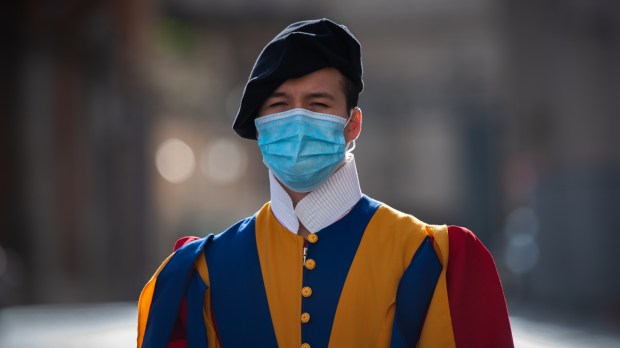The Pontifical Academy for Life — a group of scholars appointed by the pope to promote the Church’s defense of life in all stages — has released a meditative reflection on COVID-19. The text is at times poetic, asking, “Is there a thoughtful ‘stepping back’ that is other to inaction, a thinking that might mutate into thanking for life given, thus a passageway to life’s rebirth?”
The document considers the common vulnerability shared by all members of the human race, but also considers how the pandemic has emphasized our inequality.
Read the full text here, and see a segment below:
But “frail” is what we all are: radically marked by the experience of finitude at the core of our existence, not just occasionally there, visiting us with the gentle touch of a passing presence, leaving us undeterred in the confidence that everything will go according to plan. We emerge from a night of mysterious origins: called into being beyond choice, we come soon to presumption and complaint, asserting as ours what we have only been vouchsafed. Too late do we learn consent to the darkness from which we came, and to which we finally return. Some say this is all a tale of absurdity, for it all comes to nothing. But how could this nothing- ness be the final word? If so, why the fighting? Why do we encourage each other to the hope of better days, when all that we are experiencing in this pandemic will be over? Life comes and goes, says the custodian of cynical prudence. Yet its rising and ebbing, now made more evident by the fragility of our human condition, might open us to a different wisdom, a different realization (cfr Ps. 8). For the sorrowful evidence of life’s frailty may also renew our mindfulness of its given nature. Coming back to life, after savoring the ambivalent fruit of its contingency, will we not be wiser? Will we not be more grateful, less arrogant?
Vatican News interviewed Archbishop Vincenzo Paglia, President of the Academy, and asked him about how we must respond, as Christians to the pandemic.
See the whole interview here, and two excerpts below.
Q: What is the role of the Christian community in this crisis?
The Christian community can help first of all to interpret the crisis not only as an organizational fact, which can be overcome by improving efficiency. It is a matter of understanding more deeply that uncertainty and fragility are constitutive dimensions of the human condition. This limitation must be respected and kept in mind in every development project, taking care of the vulnerability of others, because we are all entrusted to each other.
It is a conversion that asks to include and elaborate existentially and socially the experience of loss. Only starting from this awareness will it be possible to involve our conscience in a change that makes us responsibly supportive in a global fraternity.
Q: Interdependence, vulnerability, cooperation, solidarity, access to treatment are the key words of this crisis. In other words: will we truly understand the value of life and the need to protect it, without ideological disputes?
This is a question that everyone must ask themselves and their community. There is no automatism that guarantees the transition from the factual interconnection (which we have experienced) to responsible solidarity (which implies an act of freedom). If there is no awakening of consciousness, we will just fix a few organizational problems, but everything will be like it used to be.
Instead, we need to rethink our models of development and coexistence, so that they are increasingly worthy of the human community. And therefore, they must be appropriate for the vulnerable people, not beyond their limits, as if they did not exist: within those limits, in fact, there are men, women and children who deserve better care. All of them, not just ours.
If we open the doors to truly global threats to the human community, not even our own will be able to save themselves. So, here’s the thing: from the “dry run” of this pandemic, we expect a burst of pride from the Humana communitas. It can make it if it wants to.

